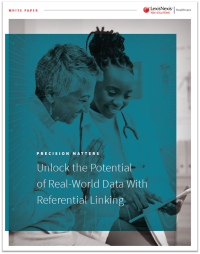Precision Matters: Unlock the Potential of Real-World Data
The introduction of a referential data to link datasets adds a level of precision and confidence previously unknown that addresses the challenges with first-generation tokenization.
Introducing a Referential Data & Referential Linking
In the rapidly evolving landscape of healthcare, the need for a referentially backed token has become increasingly evident, representing a crucial development for the industry. A referentially backed token is a unique digital identifier tethered to a specific entity or piece of information. Its significance in healthcare is multifaceted and holds immense potential to revolutionize the sector in several key ways.
First and foremost, a referentially backed token serves as a secure and unambiguous means of identifying patients. Patient misidentification remains a persistent problem, leading to medical errors, incorrect treatments, and compromised patient safety. With referentially backed tokens, each patient receives a distinct and immutable digital identity, virtually eliminating the risk of confusion or mix-up, thereby enhancing patient safety and ensuring accurate care delivery.
 Furthermore, these tokens bolster data security within the healthcare ecosystem. Healthcare systems are prime targets for cyberattacks due to the sensitive nature of patient information contained in electronic health records (EHRs). Integrating referentially backed tokens with cutting-edge encryption fortifies data security, making it nearly impervious to unauthorized access, breaches, or data breaches.
Furthermore, these tokens bolster data security within the healthcare ecosystem. Healthcare systems are prime targets for cyberattacks due to the sensitive nature of patient information contained in electronic health records (EHRs). Integrating referentially backed tokens with cutting-edge encryption fortifies data security, making it nearly impervious to unauthorized access, breaches, or data breaches.
Interoperability is another area where referentially backed tokens shine. The lack of data interoperability between disparate healthcare systems and providers has been a persistent challenge. Referentially backed tokens, serving as universal keys, grant seamless access to a patient's complete medical history, transcending system and provider boundaries. This interoperability eliminates data silos, reduces the risk of duplicate testing, and enhances overall care coordination.
In this whitepaper, we explore the benefits of the implementation of a referentially backed token in healthcare addresses numerous challenges, including patient identification, data security, and interoperability. As the healthcare sector continues to embrace technology and data-driven solutions, the need for such tokens becomes increasingly apparent. By leveraging this innovative technology, healthcare can usher in a new era of accuracy, security, and patient-centered care, ultimately benefitting both patients and healthcare providers alike.
Unlock a more
complete view
of the patient journey

Access White Paper Here
